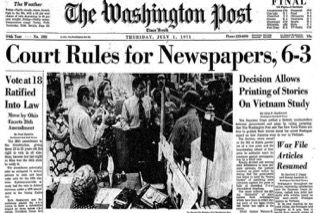REVOLUTIONARY: New movie The Post tells the incredible story of Katharine Graham and the publishing of the Pentagon Papers.
By Isabel Morehead, Staff Writer
Although the movie The Post was set more than forty years ago, the events in the film, such as the public distrust of the president, restraint of the media, and sexism in the workplace, have a striking similarity to present day America. The Post deeply connects with the American people, as they can find many of the problems we face in our current times depicted in the movie. The film tells the inspiring story of Katharine Graham, the first female publisher of the major American newspaper The Washington Post, and the newspaper’s publishing of the Pentagon Papers. The film shows there are ways to hold a corrupt government accountable and stand up for what is right and true. In these troubled times, The Post is exactly what the American people should see.
The film is set in 1971 when the U.S. was in the midst of a long, grueling war in Vietnam. The movie took place during the Nixon administration at the end of the Vietnam War, and the Pentagon Papers were a detailed description of the U.S.’s involvement in Vietnam, including military operations that were kept secret from the American public. During the late 60’s, Secretary of Defense Robert McNamara created the Vietnam Study Task Force, an organization whose objective was to create an encyclopedic history of the Vietnam War, in order to prevent future foreign policy errors. Proof that the government lied to the public about the state of the Vietnam War and the U.S.’s level of involvement was included in the study. It was revealed that presidents deliberately sent more soldiers into Vietnam when the government knew that the war couldn’t be won, and that the reason for the U.S. entering into the war was different than what the government told the public. Although it may seem commonplace now that the government lies to the American people and the public ignores what the president says, America believed what their president told them back then. When President Nixon told the public that the war was justified and would be won soon, they believed it. This mindset stimulated the public’s outrage when they discovered that they were deceived, and worse, that this deception had been carried on across decades and multiple presidencies.
In the movie, the story revolves around the staff of the Washington Post, the local Washington newspaper that, after this story, would become one of the major American newspapers. In 1971, when the Pentagon Papers were first released by someone who had worked on the Vietnam War study, the New York Times was the first to break the story. After articles were published revealing the deception of the government, the Attorney General, authorized by President Nixon, obtained an injunction barring the New York Times from publishing more than three articles on the Vietnam War study. When the New York Times (the Washington Post’s chief competitor) was unable to write further about the Papers, writers at the Post jumped at the chance to tell such an important story. Knowing the risks, the future of the company and the very lives of the staff at stake, the paper published their own set of articles exposing the government conspiracy, under the authority of publisher Katharine Graham. After their articles were released, the publication was warned by the government to cease any further publication of government secrets, which they refused. Both the Times and the Post were tried by the government after refusal to honor the injunction, but the courts ruled in favor of the newspapers’ right to publish freely. This was an important decision then and is relevant even now. It can be disheartening and frightening to see our president and his supporters discrediting news publications simply because they publish unflattering things about him, but this is the right of the press that was preserved in the case of the New York Times Corporation v. United States. This was a landmark decision because it showed that no matter the circumstances, the press has the right and the responsibility to report the truth, even if it’s dangerous to the writers or critical of the government.
Aside from the bleak circumstances of the movie and the similar conditions of our time, viewers both female and male were able to find hope in the female protagonist’s defeat of the sexism she faced in the workplace and her own doubts about her skills as a company leader. The protagonist, Katharine Graham, was the first female owner of a major American publication, an impressive feat in the 70’s. When Graham’s father died, he left the business to Katharine’s husband, but when he passed away, the newspaper was passed to Katharine. Constantly reminded by male subordinates that she was never intended to run the company, and a disturbing lack of faith in the woman who made the Post a competitor with the New York Times, the biggest newspaper in America, Katharine Graham doubted herself and her judgement constantly throughout the film, especially when the time came to decide whether or not to publish the Pentagon Papers. After deciding to publish the Papers, Katharine was still defied and constantly undermined by her male board members. In the midst of the rise of the Me Too movement, it is inspiring to see a powerful woman defying the patriarchy and trusting herself in the face of unjust sexism. In these trying times when our country’s leaders are no longer trustworthy, it is the responsibility of journalists everywhere to hold the government accountable for their actions and words. When the government won’t tell the people the truth, whether it’s in 1971 or 2018, we, as journalists, must carry the responsibility of telling the truth.

